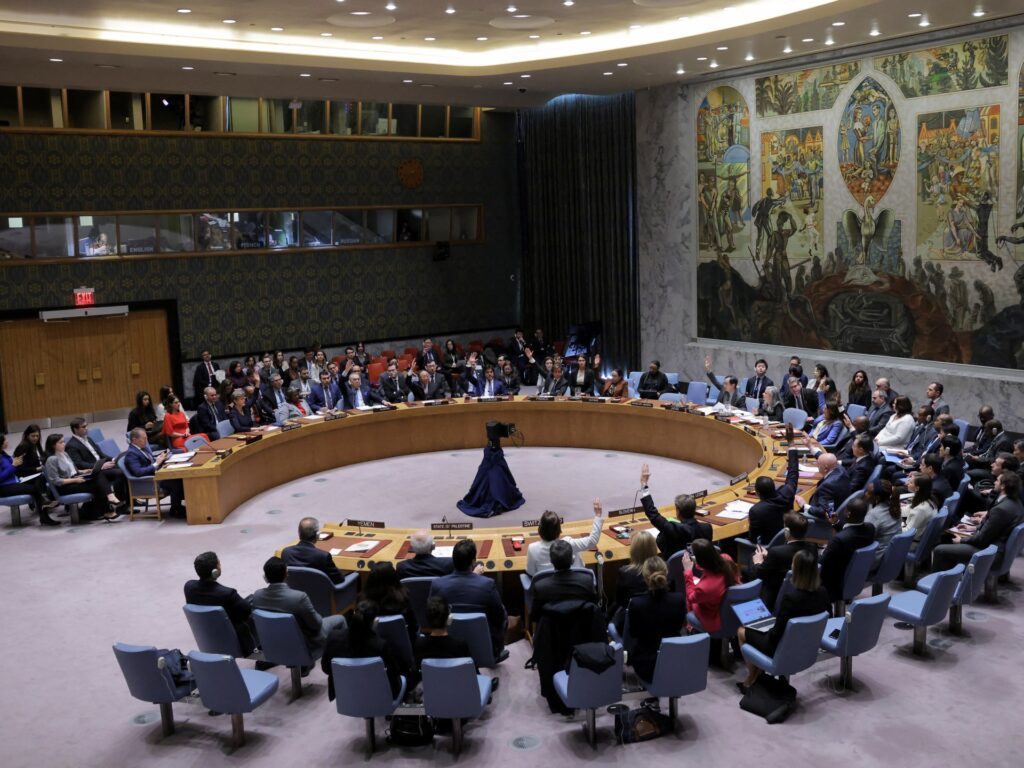With the United States abstaining from the vote, the United Nations Security Council (UNSC) called for an immediate ceasefire between Israel and the Palestinian organization Hamas in the Gaza Strip and the immediate and unconditional release of all hostages.
The remaining 14 City Council members voted in favor of the resolution on Monday.
The resolution calls for the ceasefire to lead to a “durable and sustainable ceasefire” and calls for the release of hostages taken by Hamas in the October 7 attack on Israel.
“The bloodshed has gone on for too long,” said Ammar Bendjama, the representative of Algeria, a current member of the Arab bloc’s Security Council and sponsor of the resolution. “Finally, the Security Council has taken on that responsibility,” he said.
The United States has repeatedly blocked Security Council resolutions to put pressure on Israel, but has grown increasingly frustrated with its allies as civilian casualties mount and the United Nations warns of impending famine in the Gaza Strip.
In a speech after the vote, U.S. Ambassador to the United Nations Linda Thomas-Greenfield blamed Hamas for the delay in passing the ceasefire resolution.
She said the United States abstained because it “couldn’t agree to everything in the resolution.”
“Significant edits were ignored, including our request to add condemnation of Hamas,” Thomas-Greenfield said. She stressed that the release of prisoners would lead to increased humanitarian assistance in the besieged coastal enclave.
UN Secretary-General António Guterres said in a post on X that the resolution “must be implemented”, adding: “Failure is not an option.”
The White House said in a statement after the vote that the final resolution does not include language the United States deems essential and that the vote does not represent a change in policy.
But Israeli Prime Minister Benjamin Netanyahu’s office said the US’ inability to veto the resolution was a “clear setback” from its previous position, calling for support in the war effort against Hamas and the release of more than 130 hostages. He said it would have a negative impact on the effort.
Prime Minister Netanyahu also said he would not send a high-level delegation to Washington in light of the new US position.
US President Joe Biden had requested a meeting with Israeli officials to discuss Israel’s plans for a ground invasion of Rafah in southern Gaza, where more than 1 million internally displaced Palestinians have taken refuge.
White House Press Secretary John Kirby said the United States was “disappointed” by the decision.
“We’re very disappointed that they won’t be coming to Washington, D.C., to have a meaningful conversation with them about viable alternatives to replace them on the ground in Rafa,” Kirby told reporters. Ta.
He said U.S. officials will hold separate talks with Israeli Defense Minister Yoav Gallant, who is currently in Washington, on issues such as the hostages in Rafah, humanitarian aid and civilian protection.
Prime Minister Benjamin Netanyahu last week ignored U.S. appeals and vowed to expand Israel’s military operation into Rafah even without U.S. support.
“The crisis is not over”
Al Jazeera’s foreign affairs editor James Bayes said this remained a “very, very important” development.
“Nearly six months later…the vote was almost unanimous” to call for a permanent and immediate ceasefire in Gaza.
“The United States has vetoed it three times,” Bayes said. “This time, the United States missed it.”
“Security Council resolutions are international law and are considered binding on all member states of the United Nations at all times,” he added.
The vote comes as Israeli forces have attacked Gaza in one of its most destructive operations, and the humanitarian situation in the besieged area has reached critical levels, leading to international calls for an end to the months-long conflict. It was held in a loud voice.
More than 90 percent of Gaza’s 2.3 million residents have been displaced, and the country is being pushed to the brink of starvation under Israeli siege and shelling, the United Nations has announced.
Since October 7, more than 32,000 Palestinians, most of them women and children, have been killed, and the rest of the population is suffering from devastating starvation.
In remarks after the vote, France urged efforts towards a permanent ceasefire between Israel and Hamas.
“This crisis is not over. Our parliaments must continue to mobilize and get back to work immediately. A permanent ceasefire must be established at the end of Ramadan, which ends in two weeks,” France said. said Nicolas de Rivière, representative to the United Nations.
Palestinian leaders, meanwhile, welcomed the vote, saying it was a step in the right direction.
In emotional remarks to the Security Council, the Palestinian envoy said approval of the cease-fire resolution needed to be a “turning point” to end the attack on Gaza.
“This has to be a turning point,” Riyad Mansour said, fighting back tears. “This must mark the end of this attack, this atrocity against our people.”
In a statement, the Palestinian Foreign Ministry called on Security Council member states to fulfill their legal responsibility to immediately implement the resolution.
We will also work to achieve a durable ceasefire beyond Ramadan, secure the entry of aid, release Palestinian prisoners of war in Israeli prisons, and prevent forced displacement. He also emphasized the importance of strengthening

